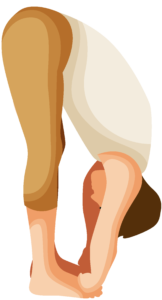Hand-To-Foot (Padangusthasana)
Pose Overview
| Common Name | Hand-To-Foot |
| Traditional Sanskrit Name | Padangusthasana |
| Sanskrit Name Pronunciation | pah-dahng-goosh-TAHS-ah-nuh |
| Pose Difficulty | Intermediate |
| Drishti
Drishti is the gaze or visual focus point during yoga poses.
Learn more about Drishti |
Tip of the nose |
Hand-To-Foot Pose, or Padangusthasana in Sanskrit, is a yoga pose that is said to be beneficial for stretching out the hamstrings and the back. The name of the pose comes from the fact that it involves bringing the hands down to the feet while standing. The pose is said to be helpful for increasing flexibility and strength in the legs, hips and lower back, and for promoting a sense of balance and focus. It is also said to be beneficial for relieving stress and anxiety, and for promoting a sense of inner peace. This pose is also said to help to improve balance and stability, and to help to release tension in the back and legs.
Benefits of Hand-To-Foot
Strengthens the legs, particularly the thighs and calves Improves balance and stability Aids in digestion and stimulates the liver and kidneys
How to Enter Hand-To-Foot
Begin standing in Mountain Pose (Tadasana) at the front of your mat. Take a deep breath and as you exhale, bend forward from the hips. Bring your hands to your shins, ankles, or the floor, depending on your flexibility. Keep your hips over your ankles and your back flat. Hold the pose for several breaths, then release as you inhale.
How to Exit Hand-To-Foot
Inhale and slowly raise your torso up, bringing your hands back to your hips. Exhale and return to Mountain Pose (Tadasana) at the front of your mat.
Common Hand-To-Foot Modifications & Variations
To deepen the stretch in the hamstrings, place a block or blanket under your hands. To make the pose easier, keep your knees bent while you're in the forward bend.
Common Mistakes with Hand-To-Foot
Rounding the back Pushing the hips back instead of keeping them over the ankles Holding the breath
Safety Guidance
If you have any knee injuries, be sure to keep your knees slightly bent to protect them. If you have any lower back injuries, be sure to keep your back flat and avoid rounding your lower back

